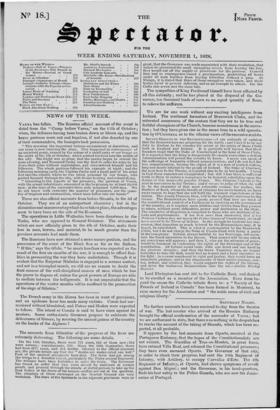NEWS OF THE WEEK.
VARNA has fallen. The Russian official account of the event is dated from the "Camp before Varna," on the 11th of October; when, the defences having been beaten down or blown up, and the brave garrison worn out and hopeless, if not also deserted by one of their commanders, the besiegers took possession.
"This morning the important fortress surrendered at discretion, and our army is now entering the place. This happened in consequence of an universal panic, caused by the ardour of a small party of our troops on the night of the 7th of October, which pushed forward into the middle of the city. The fright was so great, that the enemy began to retreat the same evening, and YoussouffPacha was the first to order his army to lay down their arms without capitulation, and surrendered himself and his followers. The whole garrison followed his example at night; and the following morning early, the Capitan Pacha and a small part of his army fled into the citadel, where he was taken prisoner by our troops, who pushed forward through the city, with drums beating and colours flying. "According to the reports of the prisoners, the garrison of Varna, with the armed inhabitants, amounted in the beginning to at least 20,000 men : at the time of the surrendr there only remained 6,000 men. We do not know with certainty the number of prisoners, nor the quan- tity of trophies and ammunition, which have fallen into our hands."
There are also official accounts from before Shumla, to the 3d of October. They are of an unimportant character ; but in the skirmishes and manmuvering which have taken place, the advantages seem to have been on the side of the Russians.
The operations in Little Wallachia have been disastrous to the Turks, who are opposed to General Geismar. The statements which are now officially given to the 4th of October, make their loss in men, horses, and materiel, to be much greater than the previous accounts had made them.
The Russians have now obtained a more secure position, and the possession of the coast. of the Black Sea as far as the Balkan. "If this," says the Globe, "be much less than was expected as the result of the first six months of the war, it is enough to afford faci- lities in prosecuting the war they have undertaken. Though it is evident that the Emperor Nicholas is engaged in a serious contest, and not in a triumphal march, we still see no reason to doubt the final success of the well-disciplined masses of men which he has the power to dispose of, unless the great powers of Europe are able to mediate between the belligerents. It is not improbable that the operations of the winter months will be confined to the prosecution of the siege of Silistria."


















